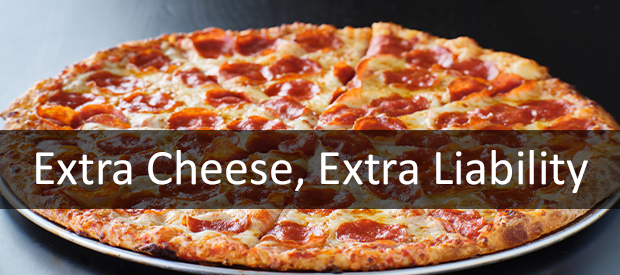Franchise 101: Too Much Control can be Painful; and Salon Franchisee Snipped, Confirmed, and Enjoined

Franchisor 101: Too Much Control can be Painful
An employee of a Domino’s Pizza franchisee, returning from a pizza delivery, collided with a motorcyclist who suffered serious injuries. After a Pennsylvania jury found Domino’s (as franchisor) vicariously liable for the negligence of its franchisee’s employee, Domino’s appealed. The appellate court affirmed the judgment against the franchisor.
On appeal, Domino’s argued the court should not have deferred to the jury’s factual findings because the franchise agreement interpretation and the Franchisor’s level of control over the franchisee’s operations were legal questions exclusively for the trial court. The appellate court concluded Domino’s raised the issue of whether the conflicting evidence from the trial could sustain the jury’s verdict. The court was thus required to evaluate the facts with deference to the jury’s verdict.
The court rejected Domino’s contention that it only oversaw product standards to ensure the quality of the products and goods associated with the brand. The court examined whether the franchisor had day-to-day control over the franchisee’s operations, finding that Domino’s adopted granular operating standards to which franchisees were required to adhere to in operating their stores that controlled day-to-day operators of the franchisee’s location.
Specifically, the franchisor had a significant degree of control over the franchisee’s employees, including requirements for the length of employees’ fingernails and facial hair; the size and amount of employees’ jewelry; topics for employee training; the amount of cash, including personal cash, drivers were permitted to carry while making deliveries; the permissible level of visible wear and tear on delivery vehicles; prohibition of hiring employees with tattoos; and the scripting of employee responses to customer complaints. Domino’s could also dictate store cleaning intervals, acceptable payment methods, the terms of location leases, the type of safe required to store cash, the number of telephones in the store; and the number and location of digital clocks displayed at the franchised location, among others.
The court concluded that the franchisor’s level of control “exceeded mere protection of its brand and trademark” and subjected the franchisee “to Domino’s will as to the minutia” of the location’s staffing and operations. The court also held that the franchisor’s mandates left the franchisee with practically no discretion as to how to conduct the day-to-day operations of its franchised location.
Many franchise systems include certain operational provisions similar to those relied on in this case. Franchise counsel should be consulted to determine if the franchisor’s level of control could result in a compelling case for vicarious liability.
Coryell v. Morris, No. J-E03001-24 (Pa. Super. Jan. 31, 2025)

Franchisee 101: Salon Franchisee Snipped, Confirmed, and Enjoined
A federal district court in Tennessee granted a motion for a default judgment in the franchisor’s favor against its former franchisee requiring the franchisee to pay damages and comply with the post-termination obligations under the parties’ franchise agreement.
Fantastic Sams, a franchisor of hair salons, and DonMarcos LLC, as a franchisee, entered into a renewal franchise agreement, requiring the franchisee to pay the franchisor weekly royalty and marketing fees and to abide by non-compete covenants both during and after the term of the franchise agreement.
During the term of the franchise agreement, the franchisee stopped fulfilling its monthly payment obligations to the franchisor, including non-payment of the required weekly royalty fee, national advertising fund fee, and required contributions to the regional advertising fund. The franchisor then terminated the franchise agreement and initiated arbitration proceedings.
Although the franchisee did not appear at the arbitration hearing, the franchisee continued to operate as a Fantastic Sams throughout the proceedings, by retaining signage and performing Fantastic Sams-approved salon treatments, all without a franchise agreement or authorization from the franchisor. The arbitrator ordered the franchisee to pay Fantastic Sams $70,309.74 in damages and ordered the franchisee to comply with the post-term non-competition covenant in the franchise agreement. After Fantastic Sams confirmed the arbitration award in court, the franchisee did not respond, pay the damages award, or comply with the non-compete provision.
The franchisor sued for trademark infringement violations, among other claims. The franchisee did not respond to the franchisor’s complaint, and as a result, a default was entered against the franchisee. The court granted franchisor default judgment and issued a permanent injunction in favor of the franchisor.
Franchise counsel can often assist terminated franchisees by facilitating early resolution before arbitration or judicial proceedings are initiated. Not only is the franchisor’s ability to terminate a franchise agreement or enforce a non-compete covenant dependent on the applicable state law, but franchise counsel can also assist franchisees in mitigating the chance of escalation by the franchisor.
Fantastic Sams Franchise Corp. v. DonMarcos, LLC., Civil Action No. 2:24-cv-2867 (W.D. Tenn. Dec. 17, 2024)